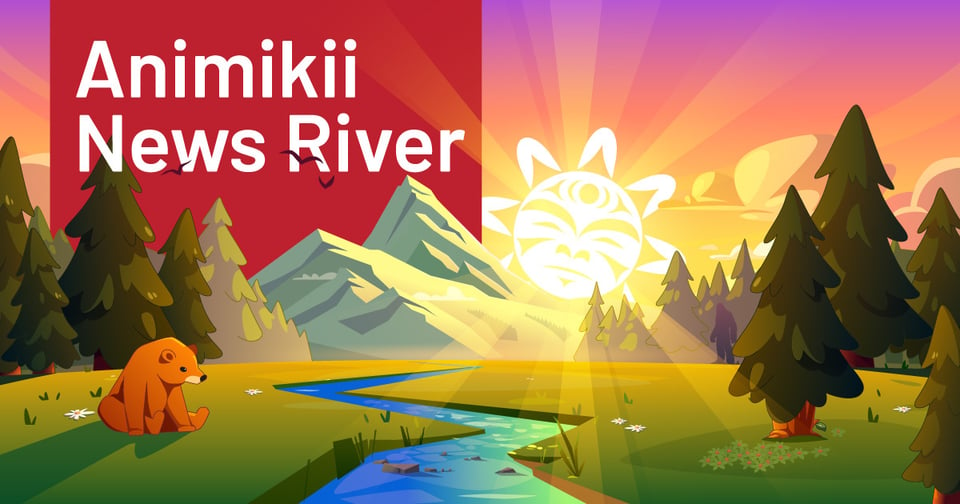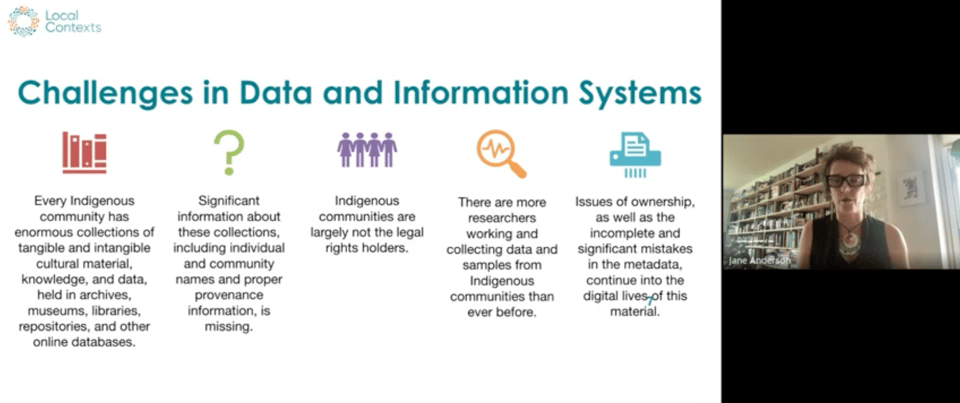Exploring IDSov and open data: “Where are your stories?”
Amplifying Indigenous Governance, Guardianship and Rematriation

Boozhoo News River Readers,
It’s a busy season as the school year is wrapping up, we are on the cusp of the summer solstice with only a few days until National Indigenous Peoples Day. There’s a national event list here if you are looking for ways to join in community celebrations on June 21st. We hope you are spending the extra daylight hours with those closest to you, doing what you enjoy.
If you enjoyed the stories in this week’s News River - invite others to join the conversation - forward this email to a friend or colleague!
Thanks for being here!
This week’s stories include:
An historic constitution: product of a decades-long process aims to restore Heiltsuk’s system of coherent governance
Dr. Amy Parent appointed UNESCO Co-Chair to advance Indigenous governance, rematriation and language revitalization.
Call for proposals now open, apply for up to $250,000 in funding from Digital Museums Canada

Open data, Indigenous data sovereignty and the CARE principles
The big picture: Part of the 'Open Research Conversations' seminar series held through the University of Sheffield on June 11, 2025, this conversation explores the tensions that exist between the movement towards open data and Indigenous Peoples’ rights to ownership and control over data emerging from their communities. Important questions addressed include: What frameworks exist to support Indigenous data sovereignty, and what tensions and challenges remain? In what ways can the co/production of knowledge relating to Indigenous communities proceed ethically and ensure the CARE principles of Collective benefit, Authority to control, Responsibility and Ethics are exercised?
Why it matters:
Every Indigenous community has collections of tangible and intangible cultural material, knowledge and data held in archives, museums, libraries and other repositories and online databases. There is significant information and provenance missing from these collections, and Indigenous communities are largely not the legal rights holders. There are more researchers working and collecting data from Indigenous communities than ever before, and issues of ownership as well as significant mistakes in metadata continue when items are digitized (Jane Anderson, Local Contexts).
About the speakers:
Jane Anderson (New York University), whose work addresses intellectual and cultural property law, Indigenous rights and the protection of Indigenous/traditional knowledge and cultural heritage. Co-founder of Local Contexts, who created the Traditional Knowledge (TK) and Biocultural (BC) Labels and Notices, a digital tagging mechanism that corrects records, brings Indigenous rights and interests into institutional contexts, and re-educates non-Indigenous peoples about Indigenous rules and responsibilities for sharing knowledge and data.
Paula Granados Garcia, head of the Endangered Material Knowledge Programme at the British Museum, She oversees the implementation of the programme, including digital preservation and curation of ethnographic resources, training, and advocacy for the work of EMKP and the Museum through research and dissemination. Paula’s background is in archaeology with a focus on cross-cultural interaction through material culture. Her research focuses on the intersection of cultural heritage and digital technologies, and the challenges of digital preservation.
Emiliano Trere, (Cardiff University, University of Valencia), is one of the co-directors of the Data Justice Lab, a world-leading hub of critical research into the relationship between datafication and social justice. He is also co-founder of the ‘Big Data from the South’ Initiative, a space for theoretical and empirical exchange on the challenges of datafication and massive data collection as they unfold in the plurality of South(s) inhabiting our increasingly complex world.
What they’re saying: “This idea of open access is a Western-developed idea that is not necessarily useful in all contexts… especially in the sense of cultural appropriation, cultural sensitivities, we are also recording peoples consent, stories and memories, and collective memories as well, and it is not always okay to present this information with an open access license” Paula Granados Garcia.
Learn more: Watch “Local Context: Tools to Support Indigenous Data and Cultural Authority”
Curated Articles:
AI Scraping Bots Are Breaking Open Libraries, Archives, and Museums
AI bots that scrape the internet for training data are hammering the servers of libraries, archives, museums, and galleries, and are in some cases knocking their collections offline, according to a new survey published today. While the impact of AI bots on open collections has been reported anecdotally, the survey is the first attempt at measuring the problem, which in the worst cases can make valuable, public resources unavailable to humans because the servers they’re hosted on are being swamped by bots scraping the internet for AI training data.
Digital Museums Canada's 2025 Call for Proposals opens June 15
As of June 15, eligible museums and heritage, cultural and Indigenous organizations are invited to apply for up to $250,000 in funding from Digital Museums Canada. Over $2 million in funding is available to create online projects, develop digital capacity, and reach new audiences through digital storytelling. Digital Museums Canada (DMC) is an investment program managed by the Canadian Museum of History. Organizations can choose from one of two investment streams: Digital Projects or Community Stories.
Product of decades-long process aims to restore Heiltsuk’s system of coherent governance destroyed by colonial powers. When outsiders arrived in the lands of the Heiltsuk people, they brought with them a rapacious appetite for the region’s trees, fish and minerals. Settlers and the government soon followed, claiming ownership of the thick cedar forests, the fjords and the abundance of life. Heiltsuk elders were confused. “If these are truly your lands,” they asked, “where are your stories?” For the Heiltsuk, stories explain everything from the shape of a local mountain to the distinct red fur fringes on the sea wolves stalking shores.
The vitality of an Indigenous food system is directly tied to how well a community can access and care for the lands and waters they have historically stewarded. In both California’s Sierra Nevada region and British Columbia, Indigenous communities face urgent climate-related impacts, including catastrophic wildfires and drought, which threaten traditional food systems and cultural landscapes. This community case study explores the knowledge sharing efforts and decision support tool development of First Nations (British Columbia), and Indigenous communities in the Sierra Nevada region in California, and academic partners to support the expansion of community-led land and water stewardship. Through Indigenous Guardian programs, participatory mapping, two-eyed seeing, and data sovereignty principles such as Ownership, Control, Access, and Possession (OCAP®), these partnerships strengthen Indigenous governance structures while addressing historical land dispossession and disrupted foodways.
Nisga’a scholar to co-lead global Indigenous research initiative
Dr. Amy Parent appointed UNESCO Co-Chair to advance Indigenous governance, rematriation and language revitalization. A Nisga’a matriarch and academic who helped bring home her family’s stolen memorial pole is taking on a global leadership role in advancing Indigenous knowledge, language, and research sovereignty. The United Nations Educational, Scientific and Cultural Organization (UNESCO) has appointed Dr. Amy Parent as Co-Chair in Transforming Indigenous Knowledge Research Governance and Rematriation. The position was created to support Indigenous communities in taking control over research and cultural knowledge. “It is still far too uncommon to see Indigenous women leading international initiatives like this,” said Parent.

